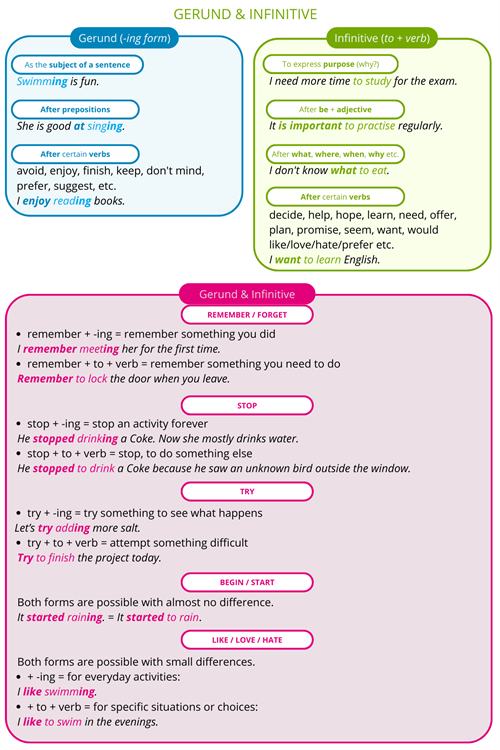PIRMĀ SEMESTRA NOSLĒGUMA TESTI
Infinitive and Gerunds
Infinitives are the base form of a verb, often preceded by to.
For example, to eat, to play, to study.
Gerunds are the -ing form of a verb that functions as a noun.
Gerunds are the -ing form of a verb that functions as a noun.
For example, eating, playing, studying.
Usage
Usage
Infinitives are used:
To express purpose: I go to the gym to exercise.
After certain verbs: Some verbs are followed by an infinitive. Examples include: want, need, hope, decide.
Example: I want to learn English.
After be + adjectives: It is important to practise regularly.
To express purpose: I go to the gym to exercise.
After certain verbs: Some verbs are followed by an infinitive. Examples include: want, need, hope, decide.
Example: I want to learn English.
After be + adjectives: It is important to practise regularly.
After what, where, when, why etc.: I don't know what to do.
Gerunds are used:
As the subject of a sentence: Swimming is fun.
After prepositions: She is good at drawing.
After certain verbs: Some verbs are followed by a gerund. Examples include: enjoy, avoid, finish.
Example: I enjoy reading books.
As the subject of a sentence: Swimming is fun.
After prepositions: She is good at drawing.
After certain verbs: Some verbs are followed by a gerund. Examples include: enjoy, avoid, finish.
Example: I enjoy reading books.
Verbs that can use both forms (gerund or infinitive)
Some verbs can take -ing or to + verb, but the meaning can change.
REMEMBER / FORGET
- remember + -ing = remember something you did
I remember meeting her.
- remember + to + verb = remember something you need to do
Remember to lock the door.
STOP
- stop + -ing = stop an activity for ever
He stopped drinking a Coke.
- stop + to + verb = stop, in order to do something else
He stopped to drink a Coke because he saw an unknown bird outside the window.
TRY
- try + -ing = try something to see what happens
Try adding more salt.
- try + to + verb = attempt something difficult
Try to finish the project today.
BEGIN / START
Both forms are possible with almost no difference.
It started raining. = It started to rain.
LIKE / LOVE / HATE
Both forms are possible with small differences.
- + -ing = for everyday activities;
I like swimming.
- + to + verb = for specific situations or choices:
I like to swim in the evenings.
Formation
Infinitive: To form the infinitive, simply add "to" before the base verb.
to + play = to play;
to + read = to read
Gerund: To form the gerund, take the base verb and add -ing to it.
play + -ing = playing;
play + -ing = playing;
swim + -ing = swimming.
Repeat the spelling rules of gerunds (the same as Present Continuous)
Summary

ROLE MODEL
A good role model has many important qualities. They are brave and try to face difficult situations without giving up. They are kind and help people who have problems. A good role model is understanding because they can see how others feel. They always try to do things well and be excellent in the things they do. They show respect to everyone, even if they are different.
A good role model is honest, so people can trust them. They are also generous and like to give their time and support to others. They give people a motive to do their best. They have self-control, which helps them work hard and follow their goals. A good role model is wise and uses their experience to help others learn and grow. All these qualities make them a great example and an inspiration for others.
Word bank:

brave — [breɪv] — (adj) showing no fear of dangerous or difficult things, drosmīgs
She was very brave to learn to ski at 50.

kind — [kaɪnd] — sgenerous, helpful, and thinking about other people's feelings, laipns
It's very kind of you to help us.

understanding — [ˌʌn.dəˈstæn.dɪŋ] — (noun) a positive relationship between two people or groups in which they feel sympathy for each other, saprašanās;
— (adj) an understanding person who has the ability to know how other people are feeling, and can forgive them if they do something wrong, saprotošs.
He had expected her to be horrified, but she was actually very understanding.

excellent — [ˈek.səl.ənt] — (adj) extremely good, izcils, teicams
The team worked hard to be excellent in their project.

generous — [ˈdʒen.ər.əs] — willing to give money, help, kindness, etc., especially more than is usual or expected, dāsns, devīgs
He was so generous that made a big difference to the children's charity.

honest — [ˈɒn.ɪst] — (adj) telling the truth or able to be trusted and not likely to steal, cheat, or lie, godīgs
I'd like you to give me an honest answer.

motive — [ˈməʊ.tɪv] — (noun) a reason for doing something, motīvs, iemesls
Does he have a motive for lying about where he was?

respect — [rɪˈspɛkt] — a feeling or attitude of admiration and regard, cieņa
We should always show respect to our teachers and elders.

self-control — [ˌself.kənˈtrəʊl] — the ability to control feelings and behaviour, paškontrole
She showed good self-control and didn’t get angry.

wise — [waɪz] — having or showing the ability to make good judgments, based on a deep understanding and experience of life, gudrs
It was a wise decision to ask for help.